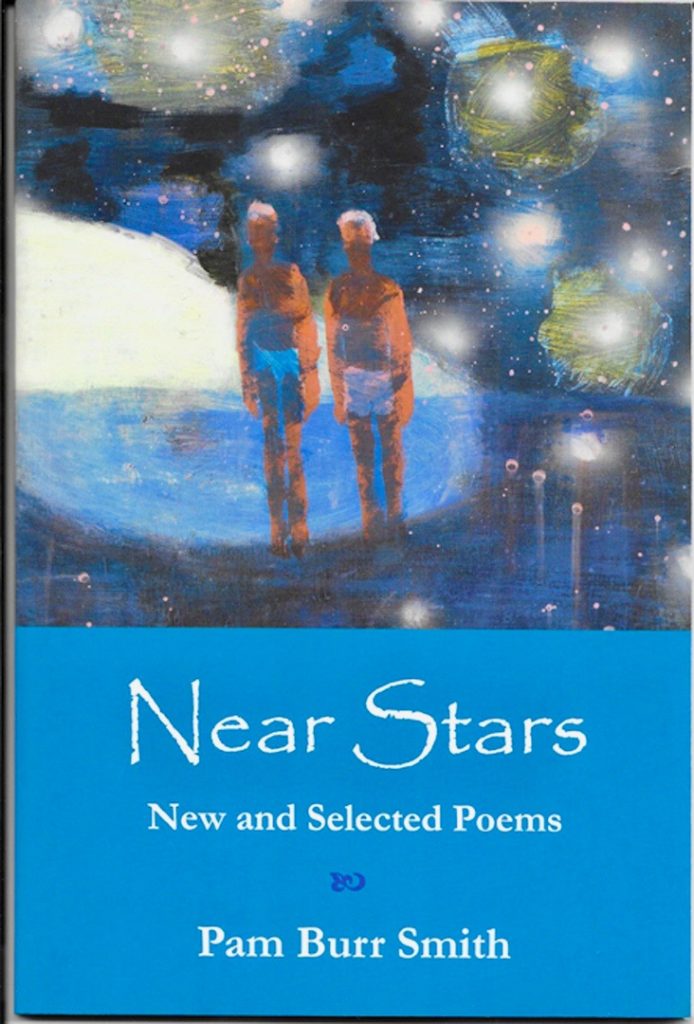Near Stars: New and Selected Poems
Near Stars: New and Selected Poems, by Pam Burr Smith.
Blackberry Books, 2019,
56 pages, paper, $14,
ISBN: 978-645162407
In her second collection, Near Stars: New & Selected Poems, Pam Burr Smith offers 47 poems, most of them one–pagers, prompted by diverse incidents and occasions: a gathering of friends, a flat tire, Wonder Bread, a visit to the health food store, a line from a Mavis Staples song. The verse unfolds in short stanzas, sometimes couplets, as Smith muses on the world around her.
Smith is a dog person — canines make cameos in a bunch of poems, including the lead–off “Amos in the Snow.” In “full deep thorough snow time,” the four–legged friend becomes one with the drifts. If the snow’s “agendas and claims are total now,” if it “owns our mortgages,” the dog remains unmoved, “a gentle, patient astronaut / at home among the galaxies.”
The poem “It” might remind you of the classic Charles Simic poem, “Two Riddles,” which plays a similar game with this nondescript yet ubiquitous noun, reveling in its imprecision. Smith’s rendering starts by exaggerating the tiny word’s might: “I love the quick slap and the authority of the word / It.” And it ends with a clever Simic–like twist: “It’s always something.” True enough.
Smith likes word play. Listening in on the conversation of a nephew and his young sister on a drive in the car, she follows the former’s attempt to make the latter say a bad word by adding and subtracting letters from “truck.” In her role as Aunt Pam, the poet fails to steer the game elsewhere and the f–word ends up echoing in her head.
With a book as warm and full of life as this one is, it seems unkind to note flaws, but for this reader there are a few. Several images felt stretched, such as “Frogs in chorus crunch summer to a close” (“A Field by a River”) and “I am spread out / diagonally strewn / soft across bamboo sheets // a sort of mind butter / over the food / of my soft bed” (“Enter the Day”). The use of “crunch” and the image of “mind butter” startle, but not in a favorable way. W. B. Yeats once proposed that a poem makes a sound when it’s finished “like the
click of the lid of a perfectly made box.” At times, Smith seems to snub her nose at this idea, preferring to end a verse with a kind of soft denouement, almost matter–of–fact. At times, one is reminded of contemplative Chinese poetry, as in the ending of “The Coming Storm”:
So I go inside
open the window
listen to the world sighing
watch restless branches
write new poems
on gray clouds.
The cover of Smith’s book features a painting, Couple on the Moon (2014), by painter Katherine Bradford. One of the poems in the collection, “Shero,” drew its inspiration from another Bradford painting, Woman Flying, in the Portland Museum of Art collection. The poem starts with a description of the painter’s flying caped “hero woman” and then shifts to a tribute to “Sheroes,” a group of women in Agra, India, victims of acid attacks who run a tea house. In the final four stanzas, Smith intertwines the painted woman and the women who run the “blessed restaurant” in Agra. “Something about ordinary goodness,” she concludes,
undressed–up, and unrelenting
saving us. Saving us. Over and over
from both the small and the monstrous.
The aforementioned Mavis Staples song–inspired poem riffs on the lyric “Love is the only transportation.” Taking her cue, Smith offers images of a mobile love. Love has “willing legs,” she writes, and declares, “The sound of love’s helicopter / is the sound of a beating heart.” In the original song, the lyric is completed by the rhyming line “To where there’s total communication.” Smith’s poems help transport us to that place: a world conveyed with aplomb and passion.
—Carl Little


